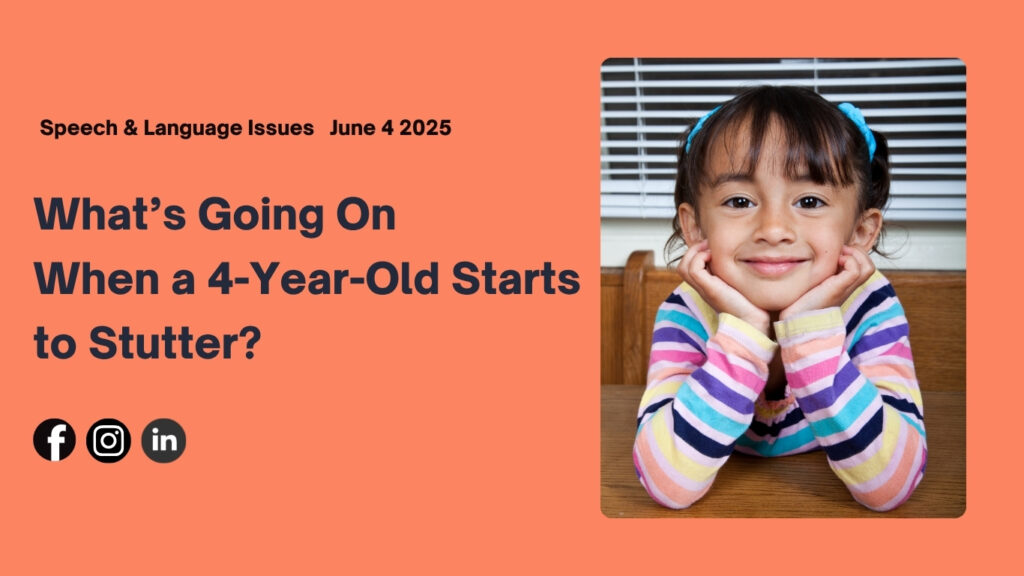
When your child stutters, they might repeat sounds (“m-m-mommy”), prolong them (“sssssoap”), or pause mid-sentence. This often shows up more when they’re excited, tired, or thinking really fast. It’s like their brain is racing ahead of their mouth.
So, if your 4-year-old is stuttering and it’s only recently started, there’s a strong chance it’s just a developmental phase. According to the American Speech-Language-Hearing Association (ASHA), about 5–10% of children will go through a period of stuttering during early childhood, and most of them outgrow it without needing any formal intervention. In many cases, stuttering in a 4-year-old is temporary and resolves on its own as their language skills catch up with their thoughts. At this age, their brains are developing rapidly, and sometimes their speech just needs a little more time to catch up.
When Should You Look Into It Further?
Sometimes, though, it can be more than a passing phase. If the stuttering lasts for more than 6 months or becomes more severe, it might be time to consider an evaluation.
Here are a few signs to look for:
- The stuttering is getting worse rather than better
- Your child seems upset or embarrassed while speaking
- They avoid talking or specific words
- There’s a family history of stuttering
- You notice visible tension or effort while they talk
If any of these apply to your 4-year-old, it’s a good idea to talk with a speech-language pathologist or developmental pediatrician. Early professional input can make a big difference in helping your child communicate more comfortably.
Simple Things You Can Do at Home
Even if the stuttering seems mild, your support at home makes a big difference:
- Let your child finish their sentences — no rushing
- Model slow, calm speech when you talk to them
- Avoid drawing attention to the stutter — this eases pressure
- Keep communication fun and low-stress
You can also try turning off distractions, like background screens, and making time each day for face-to-face conversation. Reading together, singing songs, and playing word games are all great ways to help a 4-year-old practice speech in a fun and natural way.
Still Concerned? You’re Not Alone
If you’ve been trying these strategies but still feel unsure, it’s okay to seek a second opinion. Whether your concern is big or small, having the reassurance of a professional can go a long way — not just for your child, but for your peace of mind too.
At Neuronurture, our team is trained in early childhood speech and developmental support. We offer gentle, child-centered services — from understanding stuttering to broader developmental therapies. You can start with a simple intake form — no pressure, just a first step. Even if your 4-year-old’s stuttering turns out to be developmental, early reassurance can provide you with helpful tools to boost confidence and comfort in everyday communication.
So, Is It Normal?
To wrap it up: yes, stuttering in 4-year-olds can absolutely be part of typical development. But if you’re feeling unsure, or your child seems to be struggling, it’s okay to explore your options. You know your child best.
And remember: early guidance doesn’t mean something is “wrong” — it just gives you tools to support your child in the best way possible. Getting ahead of potential challenges with early action is not overreacting — it’s proactive parenting. And in many cases, even a single consultation provides clarity and peace of mind.
Take the First Step — Gently
Still wondering if your child’s stuttering is just a phase? That’s completely okay. You don’t need to figure it out alone. When you’re ready, the team at Neuronurture is here to listen and support you — kindly, patiently, and without pressure.
You’re doing great just by asking the question.
References
Mayo Clinic. “Childhood stuttering.” https://www.mayoclinic.org/diseases-conditions/stuttering/symptoms-causes/syc-20353572
American Speech-Language-Hearing Association (ASHA). “Stuttering.” https://www.asha.org/public/speech/disorders/stuttering/